|
After gaining control of the rebellious Ionian Greeks in 495 BC, Darius I of Persia realized that they would be a perpetual
bother as long as they could gain help and encouragement from the Greek mainland so he determined to conquer Greece proper,
secure his western frontier and lay the groundwork for Persia's expansion into Europe. He was also outraged that during the
Ionian rebellion an obscure city-state (Athens) from mainland Greece had assisted in the expulsion of the Persians from Sardes,
the capitol of the Ionian Greek city-states. His anger was such that he vowed to punish them and every night at dinner he
had a servan repeat to him "Lord, don't forget the Athenians"

Darius I of Persia
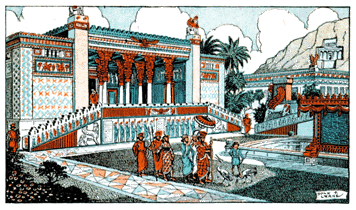
Palace of Darius I
Darius had two routes to invade Greece, one by land and one by sea. He chose them both and in 492 BC began his expedition.
However, his first attempt failed because a terrible storm destroyed his fleet.
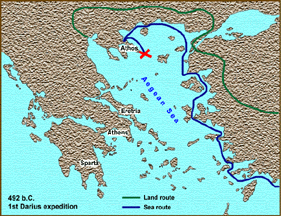
First expedition of Darius
Two years later he launched his second attempt, again by sea but with a more southernly route. This expedition resulted in
the Battle of Marathon. During the two year interval he sent heralds to the Greek city-states. The heralds, as was the custom,
asked for "earth and water" as a token of submission. Many of the Greek city-states acquiesced but many did not,
including the two most important, Sparta and Athens. The Athenians threw the heralds off the Acropolis and the Spartans threw
them down a well where there was plenty of "earth and water". The Athenians even executed the unfortunate translator
of the Persian demand for defiling the Greek language. War was now certain.
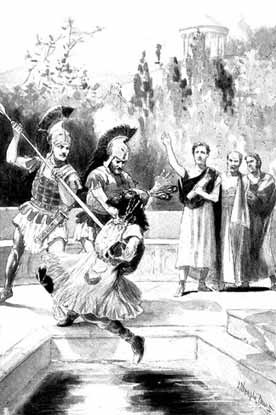
Spartans throw the envoy down a well
The Persian fleet conveying a force of infantry and calvary sailed across the Aegean Sea in late August or early September
of 490 BC.
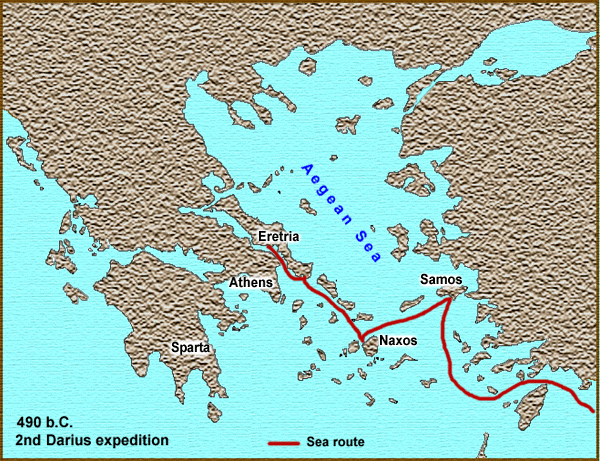
Second expedition of Darius
Most of the islands along their route submitted but Eretria did not and was under seige for six days until some of its citizens
helped the Persians enter its walls. The city was sacked, its buildings destroyed and its inhabitants who survived the massacre
that follwed were taken prisoners. This was in retaliation for the part that Eretria played in assisting Athens in the destruction
of Sardis in the Ionian rebellion. This was a clear indication to the Athenians that theirs would be the same fate.
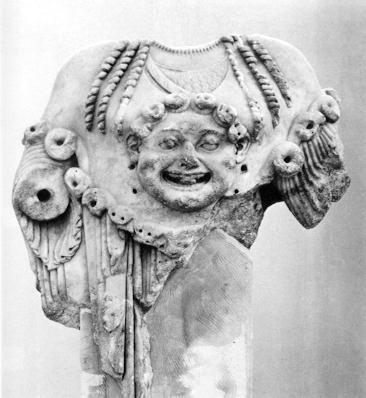
Athena from the Temple of Appollo destroyed by the Persians at Eretria
The Persian army sailed from Eretria to the Marathon Bay and landed there,
about twenty five and a half miles from Athens.
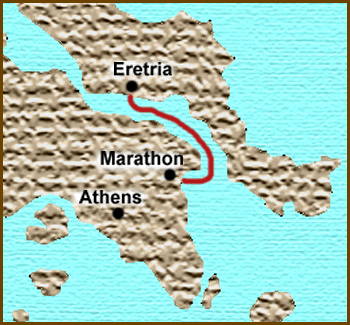
Persian sea route from Eretria to Marathon
The Athenians had sent to Sparta for help but Sparta was unwilling to leave until the moon was full and they were also reluctant
to fight beyond the borders of the Pelopennese, therefore Athens stood alone. The Spartans eventually arrived after the battle
was over. But the Athenians had a most welcome surprise when they arrived at Marathon for they were joined by a force of 1000
Plataians (their entire army) to fight against the common enemy. Athens was eternally grateful for that brave act of the Plataians.
Together they would face the Medes and their conquerors, the Persians. No one had been able to stand up against them in the
past.
The Athenian army took up its position in the Valley of Vrana, outnumbered three to one. The battle lines were about one mile
apart and the Athenians did not have enough troops to cover the entire valley. Therefore, their leading General, Miltiades,
set a weak center and strengthened the wings. Here were the characteristics of the two opposing armies. The Persian army consisted
of infantry and execellent calvary. Their tactics were of a defensive nature since their main weapon was the bow. Their usual
tactic was to wait for the enemy to come close and then to "bury" him under a barrage of arrows.
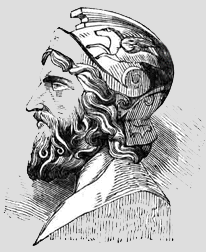
Miltiades
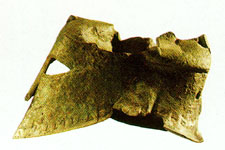
The Helmet of Miltiades
Dedication by Miltiades, as the inscription informs us "Miltiades
dedicates to Zeus". It is the same helmet worn by the Athenian general in the battle of Marathon, where he defeated the Persians,
and thus offered it to Zeus as a sign of gratitude.
Archaeological Museum at Olympia,
Greece

|
| The Immortals (persia) |

|
| Persian Calvary Man |
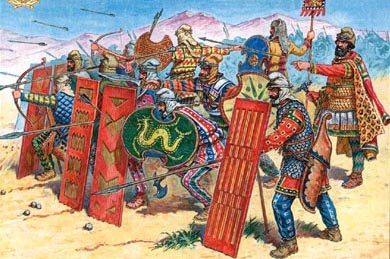
Darius' infantry
The Greek's army doctine on the other hand was of an offensive nature. Their main weapon, the long, heavy spear, their heavy
armament (helmet, shield, breastplate, greaves) and their battle formation, the phalanx, favored close combat. The Greeks
used neither bow nor calvary at this time.
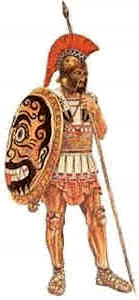
Athenian hoplite
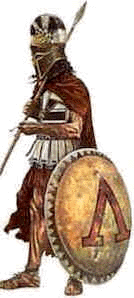
Spartan hoplite

Greek Infantry
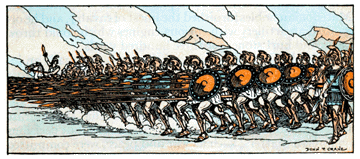

Greek phalanx
Miltiades attacked at dawn. The Athenians charged at a run. The Persians waited, not really believing that anyoneone could
run that far and still fight well. They routed the Greek weak center and charged up the valley. The Greeks retreated, pulling
the Persians forward and extending their lines. Then the Greek wings fell upon the Persian flanks while the center suddenly
stood firm. The Persians broke ranks and began to retreat. As the Greeks pressed, the retreat became a rout. The Greeks harried
them all the way to the beach and followed them into the water, swiming out after the boats and capturing seven Persian ships.
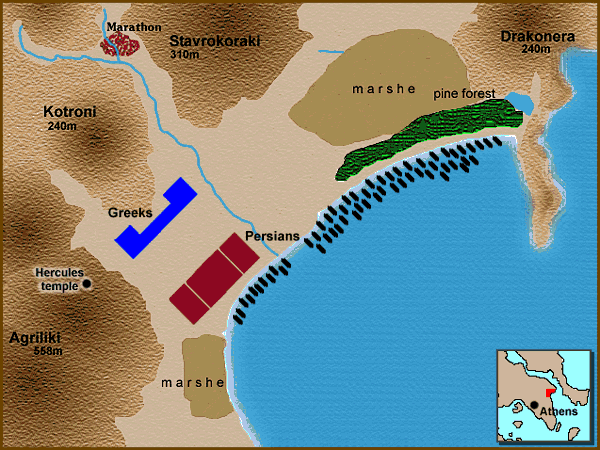
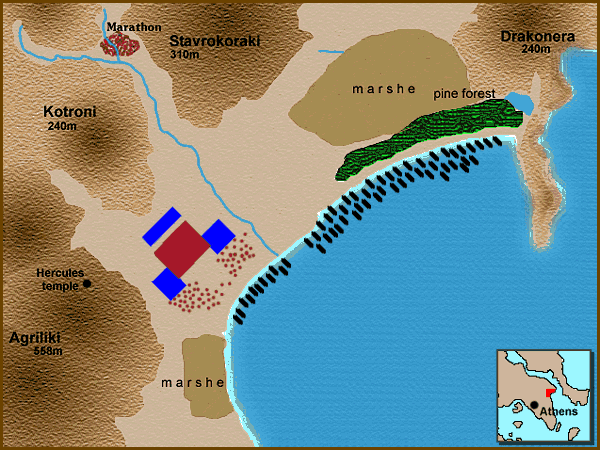
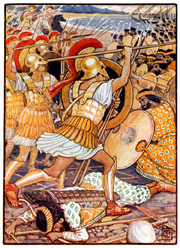
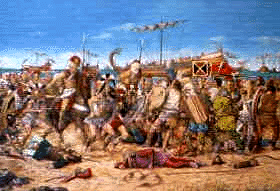
The Athenians had won at Marathon but they certainly had not destroyed the Persian army. They had made plans before the battle
that if they won, they would get word back to Athens as soon as possible because they knew that the Persian fleet was sure
to sail around Attica and attempt to take the city while it was undefended. The citizens were to man the walls and make it
appear that Athens was strongly defended. Miltiades sent a young soldier (probably Phaedippas) to take word back to Athens.
He ran the entire distance, 42.192 kms, shouted "We have won!" and fell dead of exhaustion. In memory of this event
the Marathon Run was included among the contests since the first contemporary Olympic Games.

Phaedippas
The Persians did indeed sail around Attica hoping to find the city helpless
but when they met with resistance, they hesitated. Not long after, the Greek army arrived. The Persians decided they had enough
of these Greeks and sailed home.
The Battle of Marathon is perhaps the single most important battle in Greek history.
Had the Athenians lost, Greece would have eventually come under the control of the Persians and all the subsequent culture
and accomplishments of the Greeks would probably not have taken the form they did. However, the Persian were not finished.
In 481 BC, Darius I's son, Xerxes, gathered together an army of some one hundred fifty thousand men and a navy of six hundred
ships. He was determined that the whole of Greece would be conquered by Persia.
A Sad Sequel
The Battle of Marathon
immortalized the name of Miltiades; but in a few years' time he fell from his high estate, for he failed in an expedition
against the island of Pa'ros. The Greeks had no pity for failure. As they hooted against unsuccessful atheletes in their games,
so they jeered at Miltiades. In spite of all the honors they had recently heaped upon him, the people hearkened to his enemies
when they said his failure was due to criminal conduct of some kind. He was called up for trial, though he was wounded and
forced to appear before his judges on a couch, he was fined fifty talents of silver, and when he could not pay the debt he
was cast into prison to die. So ended the life of Miltiades. Such was the gratitude shown by the Greeks to the hero of Marathon.
|